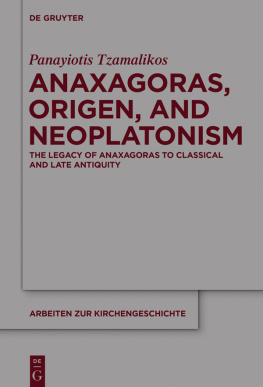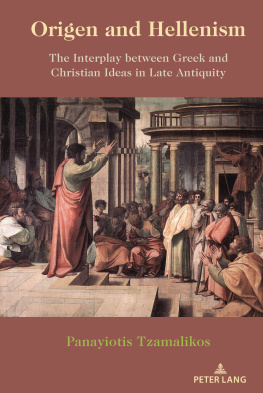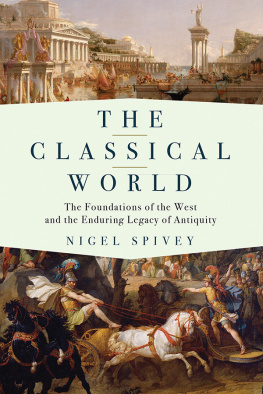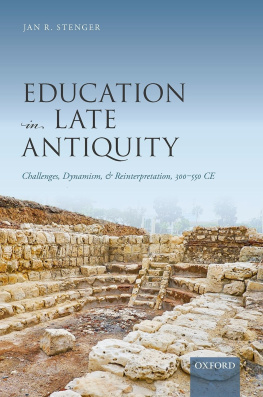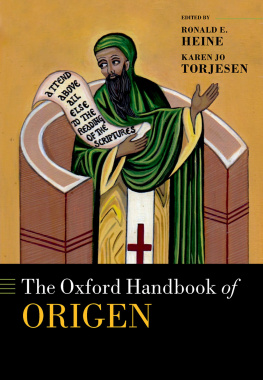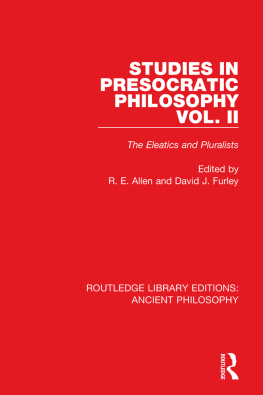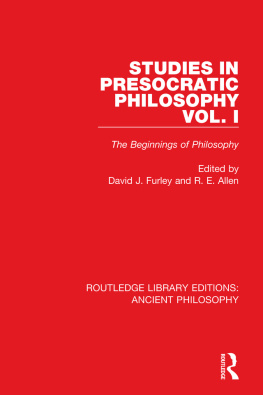Guide

Panayiotis Tzamalikos
Anaxagoras, Origen, and Neoplatonism I
Arbeiten zur Kirchengeschichte

Founded by
Karl Holl and Hans Lietzmann
Edited by
Christian Albrecht and Christoph Markschies
Volume 128/I

ISBN 978-3-11-041946-7
e-ISBN (PDF) 978-3-11-042010-4
e-ISBN (EPUB) 978-3-11-042019-7
ISSN 1861-5996
Library of Congress Cataloging-in-Publication Data
A CIP catalog record for this book has been applied for at the Library of Congress.
Bibliographic information published by the Deutsche Nationalbibliothek
The Deutsche Nationalbibliothek lists this publication in the Deutsche Nationalbibliografie;
detailed bibliographic data are available on the Internet at http://dnb.dnb.de.
2016 Walter de Gruyter GmbH, Berlin/Boston
www.degruyter.com
.
Psalm 22:55
,
.
Psalm 128:1
.
Psalm 17:40
,
.
Psalm 29:12
, .
Origen, Expositio in Proverbia , PG.17: 196.2631 & 197.3537.
.
Origen, Commentarii in Romanos ( P.Cair . 88748 & cod. Vaticanus graecus 762), p. 158.
Everything is generated from something which is existent, but it is existent potentially, whereas it is nonexistent actually ( , , ).
And this is the one of Anaxagoras.
For [my own phrasing] all things were together potentially but not actually ( , ) is better than [Anaxagoras] all things were together ( ).
Aristotle, Metaphysica , 1069b1923.
, .
Anaxagoras, apud Simplicius, In Aristotelis Quattuor Libros De Caelo Commentaria , p. 590.
.
Aristotle, De Anima , 405a1517.
. (For also in philosophy there are many phoney ones).
Origen, Contra Celsum , IV.27.
However, if one were to follow his [Anaxagoras] doctrine, and rephrase what he means to say, then he might appear propounding a novel doctrine ( , ).
Aristotle, Metaphysica , 989b46.
Aristotle wrote this rephrasing the proposition along with Anaxagoras accordingly, so as to help him express himself properly:
, .
Alexander of Aphrodisias, In Aristotelis Metaphysica Commentaria , p. 68 & Asclepius of Tralles, In Aristotelis Metaphysicorum Libros Commentaria , pp. 612.
To be sure, selfishness can magnify ones own doing and glorify it greatly, while belittling and disparaging those of others. It is because of this [selfishness] that paltry people oftentimes represent themselves as more eminent than others who are in fact far more superior.
, .
Hierocles the Stoic (second century AD), Fragmenta Ethica , p. 59, apud Stobaeus, Anthologium , 4.27.20.
Listen to the discussion between any two philosophers, one of whom upholds determinism, and the other liberty: it is always the determinist who seems to be in the right. He may be a beginner, and his adversary a seasoned philosopher. He can plead his cause negligently, while the other sweats blood for his. It will always be said of him that he is simple, clear, and right.
He is easily and naturally so, having only to collect thought ready to hand and phrases ready-made: science, language, common sense, the whole of intelligence is at his disposal.
Criticism of an intuitive philosophy is so easy and so certain to be well received that it always tempts the beginner. Regret may come later unless, of course, there is a native lack of comprehension and, out of spite, personal resentment toward everything that is not reducible to the letter, towards all that is properly spirit.
That can happen because philosophy, too, has its own Scribes and Pharisees.
Henri Bergson, The Creative Mind , An Introduction to Metaphysics.
Preface
This book is part of my struggle to learn who Origen really was. In order for this stage of my research to be realized, it took full exposition of the philosophy of Anaxagoras and its impact on Classical and Late Antiquity, right through the dawn of the Renaissance. It has been quite a long time since I noticed that Origens theology had a bearing on Anaxagoras philosophy, which was mostly obscured by apparent affinities with Stoicism. Subsequently, the more I studied Origen, the more Anaxagoras influence appeared to be there, too.
Origen has been always studied as a theologian and too much credit has been given to Eusebius implausible hagiography of him. This book explores who Origen really was by pondering into his philosophical background, which determines his theological exposition implicitly, yet decisively. In order for this background to come to light, it took a systematic exposition of Anaxagoras philosophy and its legacy to Classical and Late Antiquity (Plato, Aristotle, Stoics, Origen, Neoplatonism), which also involves critical assessment of Aristotles perverted representation of Anaxagoras that unfortunately has determined almost all of the later accounts of this philosophy.
Origen, formerly a Greek philosopher of note, whom Proclus styled anti-Platonist, is placed in the history of philosophy for the first time. He was indeed an anti-Platonist only because he was an Anaxagorean philosopher with far-reaching influence, not only on Stoics (particularly Zeno) but also on Neoplatonists, such as Porphyry, and certainly on such Christians as Gregory of Nyssa, who made the most of Origens Anaxagorean evolutionary theory of generation. Moreover, his doctrine of the soul turns out more orthodox than that of some Christian stars of the Byzantine imperial orthodoxy. As for Origen being the precursor of Nicaea, let Appendix II speak for itself.
It turned out that Anaxagoras had much the same fate as Origen: both of them were famous during their lifetimes; both of them had outstanding men of their day as pupils; both of them were utterly misunderstood and distorted by uninformed or spiteful critics; both of them came to be incriminated as dangerous blasphemers; both of them were condemned by censorial judicial assemblies backed by the State; both of them were persecuted and forced to decamp; both of them died in cities in which they settled in the third place, following decampment from their native land to conspicuous cities of letters, which were unable to tolerate their genius: Anaxagoras moved from Clazomenae to Athens, and then he fled to Lampsacus, where he taught and was buried with full honours. Origen moved from Alexandria to Caesarea, and then to Tyre, where his body was honourably interred in the cathedral basilica of Tyre. Moreover, both Anaxagoras and Origen were acclaimed as great pioneers who inspired brilliant intellectuals during the peripeteia of human thought in the quest for truth.
Since this is a study about Origen being considered as both a theologian and a philosopher, the project involved some inherent difficulties, which bear on the long established tradition of theologians and philosophers largely being indifferent to each others research, as if Greek philosophy and Christian theology were two fields impervious to each other. Moreover, in his Christian writings, Origen was loath to reveal his enormous pagan background, except for his polemic treatise against Celsus, in which he felt he should exhibit his equal, indeed superior, knowledge of pagan sources in order to discredit what he saw as impertinent attempt of derogation. Consequently, he sought not so much to refute as to overwhelm. This is why he quoted from numerous pagan sources in order to show Celsus inconsistencies and his gullibility, so as to disgrace his adversary while bolstering up his own image both as a scholar and as a learned faithful. Not only did he refute Celsus invective, but also cared to show that he was superior to his adversary on that score.

